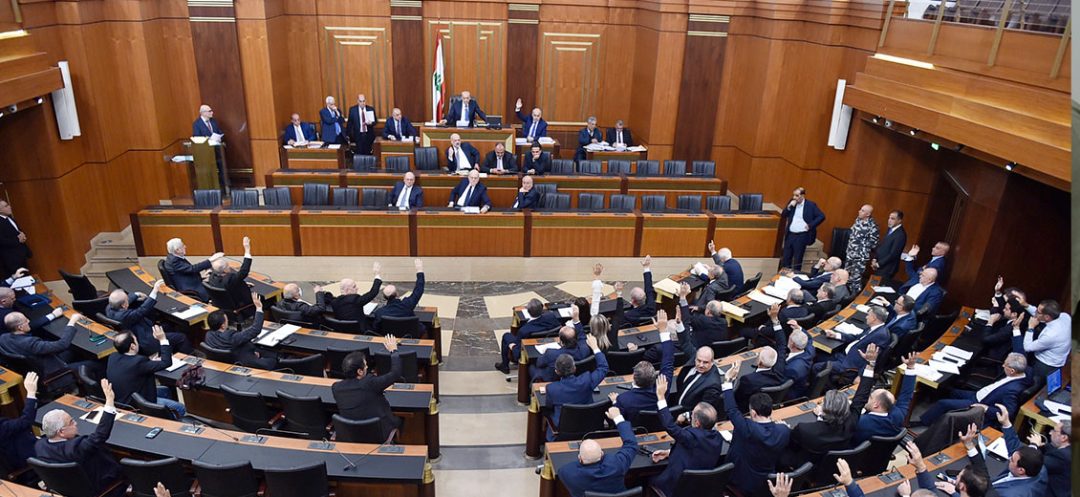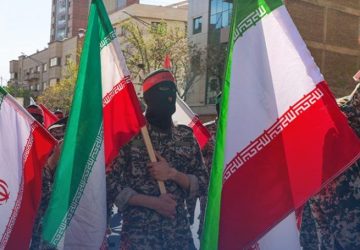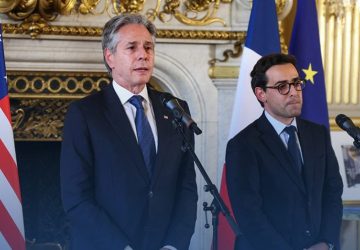Suspense that has been ongoing since the end of the summer was finally concluded today. By postponing for one year the retirement of the Army Commander and the directors of the Internal Security Forces (ISF) and General Security (GS) Generals Joseph Aoun, Imad Osman, and Elias Baissari respectively, Parliament asserted the reason of State on Friday, positioning itself as a shield against sustained destabilizing attempts driven by self-serving political agendas.
Drawn, despite its will, into a military conflict, Lebanon could not afford a leadership void within its regular forces, especially at a time when these forces are soon to play a crucial role in southern Lebanon, presently under Hezbollah control.
The fate of the army command found itself at the center of controversy as the retirement date of General Aoun was fast approaching, set for January 10, 2024, amid Lebanon’s presidential and government vacuum and while international negotiations are underway to implement UN Security Council Resolution 1701 in southern Lebanon. This resolution entails deploying UNIFIL peacekeepers and the Army across the area south of the Litani River.
The unfolding of the third session of the last parliamentary meeting of the year notably highlighted an almost political consensus around keeping the Army Commander in his position. A consensus from which the Free Patriotic Movement (FPM) and Hezbollah, unsurprisingly, diverged. The former because retaining General Aoun compromises the political ambitions of FPM leader Gebran Bassil, who perceives national issues solely through the prism of his own interests. The latter due to considerations related to Hezbollah’s current military conflict with Israel and the application of Resolution 1701.
While the FPM parliamentary bloc boycotted the meeting, Hezbollah contented itself with leaving the hemicycle just before the House addressed urgent proposals for amending the mandates of the army chief and security officials.
As soon as the pro-Iranian party members left, opposition lawmakers (who typically boycott legislative meetings convened in the absence of a president) immediately returned to their seats in the chamber to avoid a lack of quorum.
Two Paces
The political consensus was evident in the management and evolution of the parliamentary session, noted our correspondent, Rolla Beydoun. The pace of Friday’s session was markedly different from that of Thursday, which progressed slowly.
In less than an hour and a half, Parliament had completed the examination of its agenda. A bill on judicial autonomy, for the second time, was swiftly referred to the government upon the request of caretaker Prime Minister Najib Mikati, without the customary parliamentary protests. While judicial autonomy is indeed crucial, Parliament had to address the most urgent matters.
President of the Chamber Nabih Berri, Najib Mikati and Deputy Speaker of Parliament Elias Bou Saab, who was, however, opposed to keeping General Aoun in his position, facilitated the progression of debates towards a vote on the proposal to “postpone for a year the retirement of officials holding the rank of general or major general, whether they are incumbent or acting.”
In total, six bill proposals, with more or less different wording, were submitted to Parliament solely to avoid a leadership void in the army. Through intense dialogue between various opposition components since the government decided to take control of the issue, a decision was made to support the proposal of the National Moderation (NM) bloc (Walid Baarini, Mohammad Sleiman, Ahmed el-Khair, Abdel-Aziz el-Samad, Sajih Attieh and Ahmad Rustom).
The NM Bloc’s formula is important because it takes into account the generality principle of a law, in case the FPM lodges a complaint before the Constitutional Council against the passed text and claiming it is tailored to General Aoun. In the evening, this group announced its intention to do so.
Tributes to the Army
During the meeting, the parliamentary blocs that had presented similar bill proposals announced, in turn, their willingness to withdraw theirs in favor of the National Moderation bloc proposal. The latter received support from the Lebanese Forces (LF), the Kataeb, the Progressive Socialist Party (PSP), the Renewal bloc and the new Coalition for Change (Waddah Sadek, Mark Daou and Michel Doueihy).
When MP Hadi Abou el-Hosn spoke to explain why the PSP wished to withdraw its bill proposal in favor of the National Moderation bloc, thunderous applause punctuated his speech as he praised “the loyalty of the military.” On several occasions, parliamentarians applauded comments about the regular forces, especially when Berri remarked, after the law was passed, that “all Lebanese are with the army.”
Hadi Abou el-Hosn requested that the government, during its next meeting on Friday, appoint a new chief of staff to complete the military council. Elias Bou Saab, on his part, emphasized that Parliament was legislating for a single individual and praised MP Sethrida Geagea (LF) for her party’s participation in the legislative session, even though the Lebanese Forces boycott all Parliament meetings, believing they should only convene to elect a president. “It’s the Lebanese people who should be congratulated,” Geagea retorted, while the Deputy Speaker of the Chamber emphasized that Parliament “must now meet to elect a president.”
The chairman of the Parliamentary Administration and Justice Committee, Georges Adwan (LF), praised Berri for managing the parliamentary session.
The latter did not stop teasing the LF deputies during the three sessions on Thursday and Friday. Although they had agreed to go against their principled position of boycotting legislative meetings to avoid a leadership void in the army, they were present in the hemicycle but did not participate in debates on the examined bills or in votes. Regularly, with a smile on his face, Nabih Berri asked, “And what is the opinion of the Lebanese Forces on this point?” Unfailingly, Georges Adwan responded, “We do not participate in the debate.”
After the vote on the National Moderation bloc’s bill proposal, Berri stated that if Parliament delayed the retirement of the generals, it was because the government had not made a decision on the matter.
His explanation is, in fact, just the tip of the iceberg. According to various consistent sources, the quorum failure that prevented the Council of Ministers from meeting was intentional.
The resolution of General Joseph Aoun’s dossier was made possible through political role-playing in which practically all major political components took part, ultimately sidelining the Free Patriotic Movement (FPM) and preventing it from lodging an appeal that might have risked being accepted, at a time when Lebanon cannot afford a leadership void in the army.
In any case, it is noteworthy that for the first time since the May 2022 elections, the parliamentary opposition managed to assert itself in a chamber with a variable majority. A significant victory for the opposition, demonstrating on Friday that it is capable of forming a majority when its components unite their forces.





